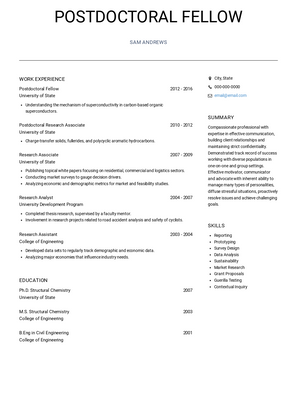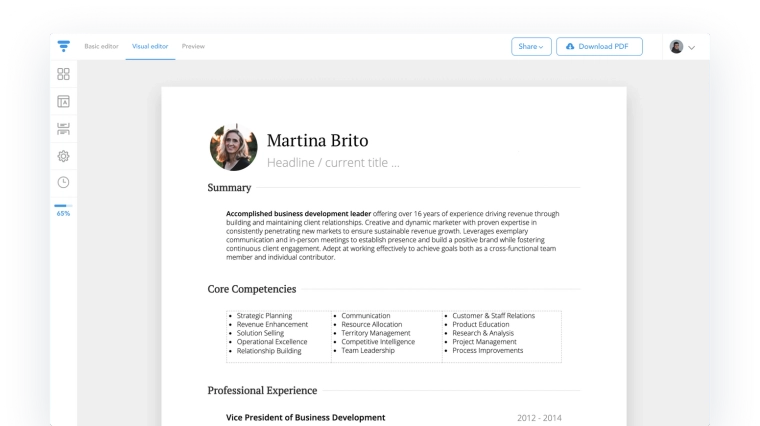Postdoctoral Fellow Resume Examples [+ 2 Samples]
This page provides you with Postdoctoral Fellow resume examples to use to create your own resume with our easy-to-use resume builder.
Also, check out our collection of 500+ resume examples.

Overview
As a postdoctoral fellow, you are well aware that resumes are a crucial stage of the recruiting process: they must be perfect. You are looking for a new position and you want that resume that not only is up to par, but can also make the real difference when it comes down to you and other candidates.
You might feel lost when it comes down to creating the best resume to get you the job you have always dreamt of, but do not worry! With the best postdoctoral resume sample in the market, we have inspired quite a few colleagues of you in the past and we want to do the same for you: your resume will look fantastic and recruiter will take notice of you, we promise. We are exactly what you are looking for, let us help you create an outstanding resume right now!
How to Write a Postdoctoral Fellow Resume?
You have to show all sides to you as a professional: that means your talents, skills, education and work history. Putting these together to create a resume isn’t as difficult as it sounds and you don’t have to make this an essay that stretches onto ten pages, but rather a one or two page masterpiece.
What is fundamental in any academic application process is writing an academic resume that showcases your best wins and lets the recruiter feel and believe that you would be the best asset to any educational institution you’re looking to join.
Don’t forget, font styles mean everything to the eye of the recruiter! Therefore, you want to choose a font style that offers a nice look to the resume. Fonts can be anything you like just as long as they can be read. Basic fonts probably are the better options here as they are easy to read and that’s what you want in a sense. Fancy fonts look nice but they can be at times difficult to read and that’s a problem for any employer looking over your resume.
Oh, please save your resume as a .pdf as, unfortunately, Microsoft Word is not great at keeping layouts intact.

The Summary Section
Good summaries will change the way recruiters will look at your resume and, trust us, they will get employers to take notice of you.
A short summary is the key here, you do not want to list everything you are going to say later as well: this is your 30-seconds pitch to your future employer, do not waste your opportunity!
Our tips are as follows:
DO (Summarize your employment)
- Use a professional tone to the summary.
- Add a brief statement about your skills and talents.
- Talk about what you’ve achieved.
DON’T (Summarize your life)
- Have errors with your spelling.
- Elaborate too much.
- Fill this section up with numbers only.
Work Experience
As a postdoctoral fellow you might not have ten or twenty years of work experience behind you but you still have had some work experience during your education and training. You absolutely have to include any and all work experience you might have had as it’s what the recruiters are looking for. Recruiters want to know the type of history you have in terms of what makes you qualified for the position as postdoctoral fellow.
You have to ensure your resume has a good array of work experience and with our tips you could hopefully reach the next level.
DO (summarize your work history)
- Fit your work experience into your postdoctoral position.
- Keep your job experienced in reverse-chronological order.
- Be consistent throughout your resume
DON’Ts (summarize your relationship history):
- Have lots of work experiences listed.
- Overcrowd information in your work experience.
- Miss out your top achievements or awards.
For more tips on writing the best work experience section for a PostDoctoral fellow like you, check out our detailed resume guide.
Education
You are a postdoctoral fellow and your education is the number one element you should talk freely about. This is your strongest area, you have gone through many years of education and this is your comfort zone. Take your time when it comes down to this section of your resume, and make sure you are happy with it before you send it to any recruiter!
First of all, we strongly suggest you list all your post-secondary degrees in reverse chronological order. You should start with the most recent one and follow with the one before it, and so on.
- These are the basics to include also:
- Your major and minors, if applicable
- Department and institution
- Dissertation/Thesis Title and Advisor
What is more, if you are in the middle of additional studies, you should list them as well. It’s really a great way to show your eagerness to learn and willingness to improve your knowledge as well. Employers like to see people who take their work seriously.
Best Postdoctoral Fellow Skills
Firstly, when it comes to talking about your skills you really want them to shine through. Remember, recruiters are looking at digital searches to find the candidates which match their criteria. You are going to have to optimize your resumes to ensure the right skills and keywords standout and that you give yourself the best chance to succeed also.
You will have to talk about your hard skills along with your soft skills so that recruiters find the best things about you also. We can help you with this part if you aren’t sure about soft or hard skills.
| Soft Skills | Hard Skills |
|---|---|
| Good Work Habits | Public speaking |
| Project Management | Research |
| Leadership | Graduate advising |
| Interpersonal Skills | Stakeholder Management |
Cover Letter: yes or no?
Take the time to create a cover letter as it’s extremely important to the recruiter. If you don’t know where to start, we have a few samples you can follow here.
What should I include in my objective statement on a postdoctoral fellow resume?
Your objective statement should emphasize your research expertise, your commitment to advancing knowledge in your field, and your eagerness to contribute to the specific research goals of the lab or institution. For example: "Dedicated and results-driven researcher with a Ph.D. in [Your Field], seeking a Postdoctoral Fellow position at [Institution Name]. Eager to contribute to groundbreaking research in [specific area of research], leveraging my expertise in [mention specific skills or techniques]. Committed to advancing scientific knowledge and collaborating within a dynamic research team."
How can I highlight relevant skills on a postdoctoral fellow resume if I have limited postdoctoral experience?
If you have limited postdoctoral experience, focus on the skills you developed during your Ph.D. research, such as data analysis, experimental design, and specific lab techniques. Highlight any publications, conference presentations, or collaborations that demonstrate your ability to contribute to the scientific community. Additionally, emphasize your ability to work independently, manage projects, and communicate complex ideas effectively.
Should I include teaching experience on my postdoctoral fellow resume?
Yes, including teaching experience is valuable, especially if it involved mentoring students, leading laboratory courses, or giving lectures. Teaching experience demonstrates your ability to communicate complex concepts, manage time effectively, and mentor junior researchers, all of which are important skills for a postdoctoral fellow.
How can I demonstrate my research impact on my resume?
To demonstrate your research impact, include details about your publications, conference presentations, and any awards or honors you have received. Highlight your contributions to specific research projects, emphasizing the outcomes or advancements resulting from your work. If your research has been cited by others, mention this as well, as it indicates the relevance and impact of your work within your field.
What should I include in the education section of my postdoctoral fellow resume?
Include your Ph.D. degree in your specific field of study, as well as any relevant Master's or Bachelor's degrees. Mention the title of your dissertation and the name of your advisor, especially if they are well-known in the field. If you received any honors or awards during your studies, such as fellowships or research grants, be sure to include those as well.
Can I include non-research work experience on my postdoctoral fellow resume?
Yes, non-research work experience can be valuable, especially if it demonstrates transferable skills such as project management, teamwork, or technical expertise. For example, roles in industry, consulting, or technical support can provide relevant experience for a postdoctoral fellow, particularly if they involved problem-solving, data analysis, or collaboration with others.
How do I format a postdoctoral fellow resume with limited postdoctoral experience?
Use a clean and professional format with sections for your objective, skills, education, research experience, and publications. Start with a strong objective statement that outlines your enthusiasm for the role. Then, list your technical skills and research experience, including any projects, collaborations, or relevant coursework. Highlight your publications, conference presentations, and any awards or honors that support your qualifications.
How important is a cover letter when applying for a postdoctoral fellow position with limited experience?
A cover letter is very important as it allows you to explain your research interests and how your background aligns with the goals of the lab or research group. Use the cover letter to highlight your research achievements, your interest in the specific research being conducted at the institution, and your commitment to contributing to their scientific community. Tailoring your cover letter to the specific position and research focus can help make a strong impression.
How can I make my postdoctoral fellow resume stand out with limited experience?
To make your resume stand out, focus on your research achievements, technical expertise, and any relevant publications or conference presentations. Highlight your ability to design and conduct experiments, analyze data, and collaborate with other researchers. Tailoring your resume to the specific research interests of the lab or institution can also help you differentiate yourself from other candidates.
Extra tips
We want to go the extra mile to help you land your dream job: check out these extra tips for your standout resume
DO (make yourself look great)
- Include strengths
- Talk about your talents
- Sound confident
DON’T (embarrass yourself)
- Forget to add your cover letter.
- Opt for three different fonts.
- Use more than one font size.
- List part-time university gigs you had
Not only we provide the best video producer resume sample in the market, we have also worked on fantastic video producer resume templates. You should check this masterpiece we have been working on here : many professionals like you have successfully used it to take their career to the next level.
-
What should I include in my objective statement on a postdoctoral fellow resume?
-
Should I include teaching experience on my postdoctoral fellow resume?
-
What should I include in the education section of my postdoctoral fellow resume?
-
Can I include non-research work experience on my postdoctoral fellow resume?
-
How do I format a postdoctoral fellow resume with limited postdoctoral experience?
-
How can I make my postdoctoral fellow resume stand out with limited experience?
Copyright ©2025 Workstory Inc.
